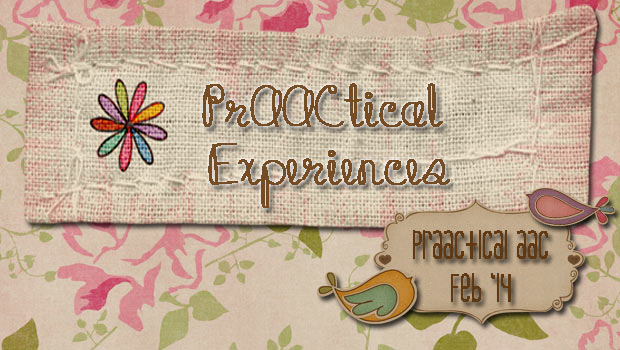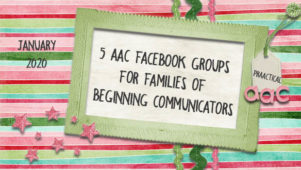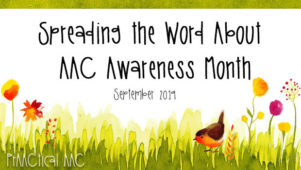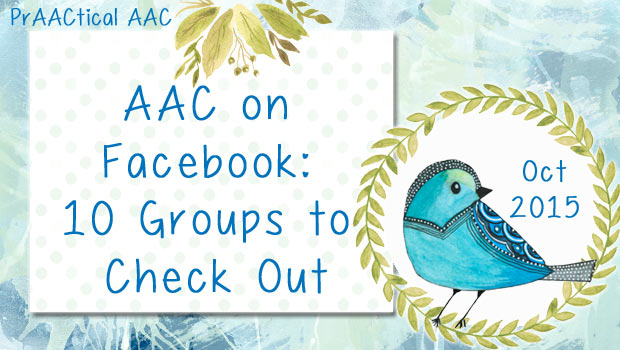PrAACtical Experiences

What do you wish you had known when you started providing AAC services?
Awhile back, we posed this question on our Facebook page: “What are two things you wish you had known when you started providing AAC services?” The prAACtical responses got us thinking. Take a look.
![]() “The families need just as much training as the kids do.” Yup, and we’ll add something else to that. WE need training, too! We expect so much of ourselves, which is fine, but we also need administrators, agencies, and colleagues to realize that it takes a lot to keep up with changes in the science and technology. That doesn’t come cheap or easy.
“The families need just as much training as the kids do.” Yup, and we’ll add something else to that. WE need training, too! We expect so much of ourselves, which is fine, but we also need administrators, agencies, and colleagues to realize that it takes a lot to keep up with changes in the science and technology. That doesn’t come cheap or easy.
![]() “Don’t be afraid to ask others in the field. They are so helpful for problem solving.” We couldn’t agree more. Most AAC professionals we’ve met have been incredibly supportive. Reach out to others in your area, through social media, and at conferences. There is a great deal of experience and creativity out there that AAC people generously share.
“Don’t be afraid to ask others in the field. They are so helpful for problem solving.” We couldn’t agree more. Most AAC professionals we’ve met have been incredibly supportive. Reach out to others in your area, through social media, and at conferences. There is a great deal of experience and creativity out there that AAC people generously share.
![]() “Just keep trying.” This.is.the.best.advice.ever. Seriously, when things don’t go well, just stick with it. Tweak things. Modify the approach. Try something else. Whatever you do, don’t give up. You may feel discouraged or unappreciated, but hang in there.
“Just keep trying.” This.is.the.best.advice.ever. Seriously, when things don’t go well, just stick with it. Tweak things. Modify the approach. Try something else. Whatever you do, don’t give up. You may feel discouraged or unappreciated, but hang in there.
![]() “That not everyone in the special ed and speech fields has the passion for it that I do.” Yup. We hear ya.
“That not everyone in the special ed and speech fields has the passion for it that I do.” Yup. We hear ya.
![]() “That simply attending (or delivering) an AAC training, (no matter how good the training) is not sufficient. You need to SEE someone teaching AAC using aided language stimulation to truly understand a) how to do it, and, b) that it’s not hard, but more like a change in habits. Just as AAC users MUST have models of language on the system they will be using, those who support AAC MUST have models by skilled individuals (even if it’s on video). It’s no different.” Nothing to add. She said it all.
“That simply attending (or delivering) an AAC training, (no matter how good the training) is not sufficient. You need to SEE someone teaching AAC using aided language stimulation to truly understand a) how to do it, and, b) that it’s not hard, but more like a change in habits. Just as AAC users MUST have models of language on the system they will be using, those who support AAC MUST have models by skilled individuals (even if it’s on video). It’s no different.” Nothing to add. She said it all.
![]() “We are somehow wired to over-prompt. We must come up with strategies to force ourselves to wait, teach those strategies, and continually support those who must support AAC users. Over prompting in combination with low expectations and failure to provide core words robs those with complex communication needs of the language to live a more fulfilling and independent life.”
“We are somehow wired to over-prompt. We must come up with strategies to force ourselves to wait, teach those strategies, and continually support those who must support AAC users. Over prompting in combination with low expectations and failure to provide core words robs those with complex communication needs of the language to live a more fulfilling and independent life.”
![]() “Modeling appropriate language in different situations. Especially if they are older and using a device for the first time, they don’t always know what language to use in a given situation.”
“Modeling appropriate language in different situations. Especially if they are older and using a device for the first time, they don’t always know what language to use in a given situation.”
![]() “Use AAC everywhere- it’s not just for therapy sessions or inside the home. I guess this goes back to training caregivers just as much- but to be truly successful the child, teen or adult must know they can have a voice everywhere.” Indeed.
“Use AAC everywhere- it’s not just for therapy sessions or inside the home. I guess this goes back to training caregivers just as much- but to be truly successful the child, teen or adult must know they can have a voice everywhere.” Indeed.
Thanks to Erin, Lauren, Jasmine, Jessica, Gwen, and everyone else who took the time to ponder and share.
Filed under: PrAACtical Thinking
Tagged With: experience, Facebook, wisdom
This post was written by Carole Zangari





1 Comment
Great post! Will share my clinicians and students at LIU/Post. All so true! Support and functional practice- reinforcement is essential.